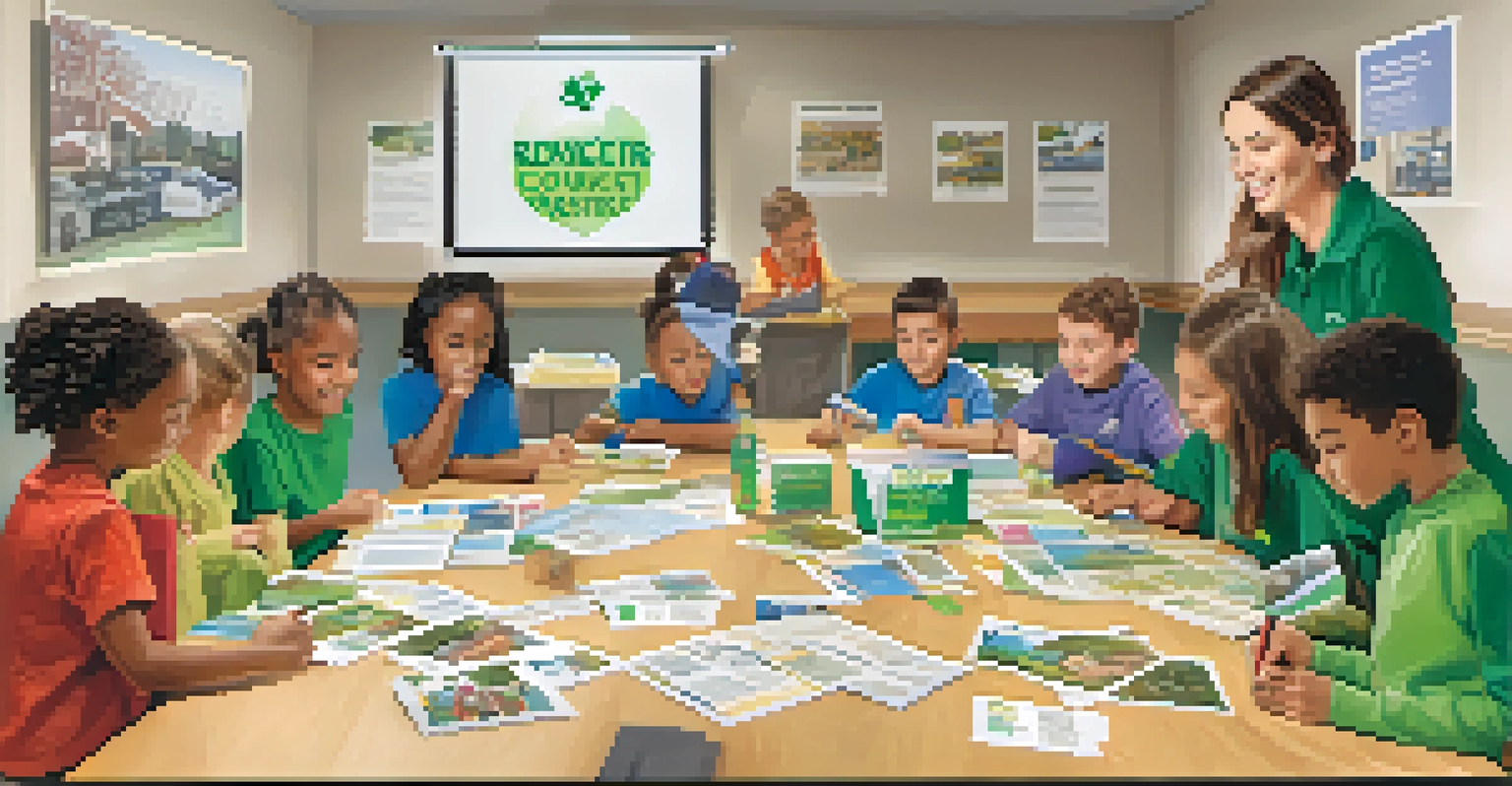Waste Management Strategies in Rochester: A Sustainable Approach

Understanding Waste Management and Its Importance
Waste management involves the collection, transport, processing, and disposal of waste materials. It's crucial not just for keeping our cities clean, but also for protecting the environment and public health. In Rochester, effective waste management strategies are essential as the population grows and the amount of waste generated increases.
The greatest threat to our planet is the belief that someone else will save it.
By implementing smart waste management practices, Rochester aims to minimize waste, conserve resources, and reduce pollution. This is not just a local issue; it reflects a broader global challenge where communities are looking for sustainable solutions. Each person's contribution to waste management can lead to significant positive changes over time.
Understanding the intricacies of waste management helps residents appreciate the efforts involved in keeping the city clean. It fosters a sense of responsibility and encourages individuals to participate actively in recycling and reducing waste, ultimately leading to a more sustainable Rochester.
Rochester's Current Waste Management Practices
Rochester has developed a comprehensive waste management system that includes curbside pickup, recycling programs, and composting initiatives. The city emphasizes the importance of separating recyclables from regular trash to divert waste from landfills. This structured approach helps streamline waste processing and ensures that materials are reused whenever possible.

Among the notable practices is the city's recycling program, which allows residents to recycle a variety of materials, including plastics, metals, and paper. Residents are encouraged to familiarize themselves with what can be recycled and how to do it properly. This education is vital, as contamination can lead to entire batches of recyclables being sent to the landfill instead.
Rochester's Waste Management System
Rochester has implemented a comprehensive waste management system that emphasizes recycling and composting to minimize landfill waste.
Composting is another crucial aspect of Rochester's waste management strategy. By encouraging residents to compost organic materials, such as food scraps and yard waste, the city not only reduces the volume of waste but also creates nutrient-rich soil. This practice supports local gardening efforts and promotes a circular economy.
The Role of Community Engagement in Waste Management
Community engagement plays a pivotal role in the success of waste management strategies in Rochester. The city organizes workshops, educational campaigns, and community clean-up events to raise awareness and encourage active participation. By involving residents, Rochester fosters a sense of ownership and responsibility towards waste management.
We won’t have a society if we destroy the environment.
These initiatives not only educate the public about proper waste disposal but also inspire creative solutions to waste-related challenges. For instance, community members often come together to brainstorm ways to reduce plastic usage or increase composting efforts. Such collaboration leads to innovative practices that benefit everyone.
Additionally, feedback from residents helps the city evaluate and improve its waste management programs. When people feel their voices are heard, they are more likely to participate and invest in the community's sustainability goals. This two-way communication creates a dynamic relationship between the city and its residents.
Innovative Technologies in Waste Management
Rochester is embracing innovative technologies to enhance its waste management practices. Advanced waste sorting systems, for example, utilize sensors and AI to separate recyclables from trash more efficiently. This not only speeds up the recycling process but also reduces human error, leading to cleaner recycling streams.
Furthermore, the city is exploring the use of smart bins equipped with sensors that alert waste management services when they're full. This technology helps optimize collection routes and schedules, reducing fuel consumption and operational costs. It's a win-win for both the environment and the city’s budget.
Community Engagement is Key
Active community involvement through workshops and education fosters a sense of responsibility and enhances the effectiveness of waste management strategies.
These technological advancements reflect Rochester's commitment to sustainability and efficiency. As these tools become more integrated into daily operations, they have the potential to significantly improve the overall effectiveness of waste management. Residents can feel confident knowing that their city is at the forefront of innovation.
The Importance of Recycling in Rochester's Strategy
Recycling is a cornerstone of Rochester's waste management strategy, helping to minimize landfill usage and conserve natural resources. By recycling materials such as glass, plastic, and paper, the city can reduce the demand for new raw materials. This not only lessens environmental impact but also supports local jobs in the recycling industry.
Rochester's recycling program has seen a steady increase in participation over the years, thanks to ongoing education and community outreach. Residents are encouraged to understand the recycling process and its benefits. The more people recycle, the less waste ends up in landfills, leading to a cleaner, healthier environment.
Moreover, recycling contributes to the circular economy by turning waste into valuable resources. By fostering a culture of recycling, Rochester sets a positive example for other communities. The city shows that recycling is not just a task, but a vital part of sustainable living.
Composting: A Key Component of Sustainability
Composting has gained traction in Rochester as a vital part of its waste management strategy. By composting organic waste, residents can significantly reduce the amount of waste sent to landfills. This practice not only minimizes waste but also enriches the soil, supporting local agriculture and community gardening initiatives.
The city provides resources and support for residents interested in starting their own composting systems. Workshops and informational guides are available, making it easier for people to understand the composting process. This hands-on approach encourages more residents to participate, leading to a healthier community overall.
Innovative Technologies Enhance Efficiency
The city is adopting advanced technologies, such as AI sorting systems and smart bins, to improve waste processing and reduce operational costs.
Additionally, composting helps to lower greenhouse gas emissions. When organic waste decomposes in landfills, it produces methane, a potent greenhouse gas. By composting instead, Rochester not only reduces waste but also takes significant steps toward combatting climate change.
Future Goals for Waste Management in Rochester
Looking ahead, Rochester has set ambitious goals for its waste management strategies. The city aims to achieve a significant reduction in landfill waste by increasing recycling and composting rates. By 2030, the target is to divert at least 50% of waste from landfills, a goal that will require continued community engagement and innovative practices.
Moreover, Rochester is investing in further technologies to streamline waste management processes. This includes enhancing recycling facilities and exploring new methods for waste reduction. As the city embraces these advancements, it will be better equipped to handle the increasing volume of waste generated by its growing population.

To support these goals, ongoing education and community involvement will be crucial. By fostering a culture of sustainability and environmental responsibility, Rochester can create a cleaner, healthier city for future generations. The collective efforts of the community, local government, and innovative technologies will shape a sustainable future.